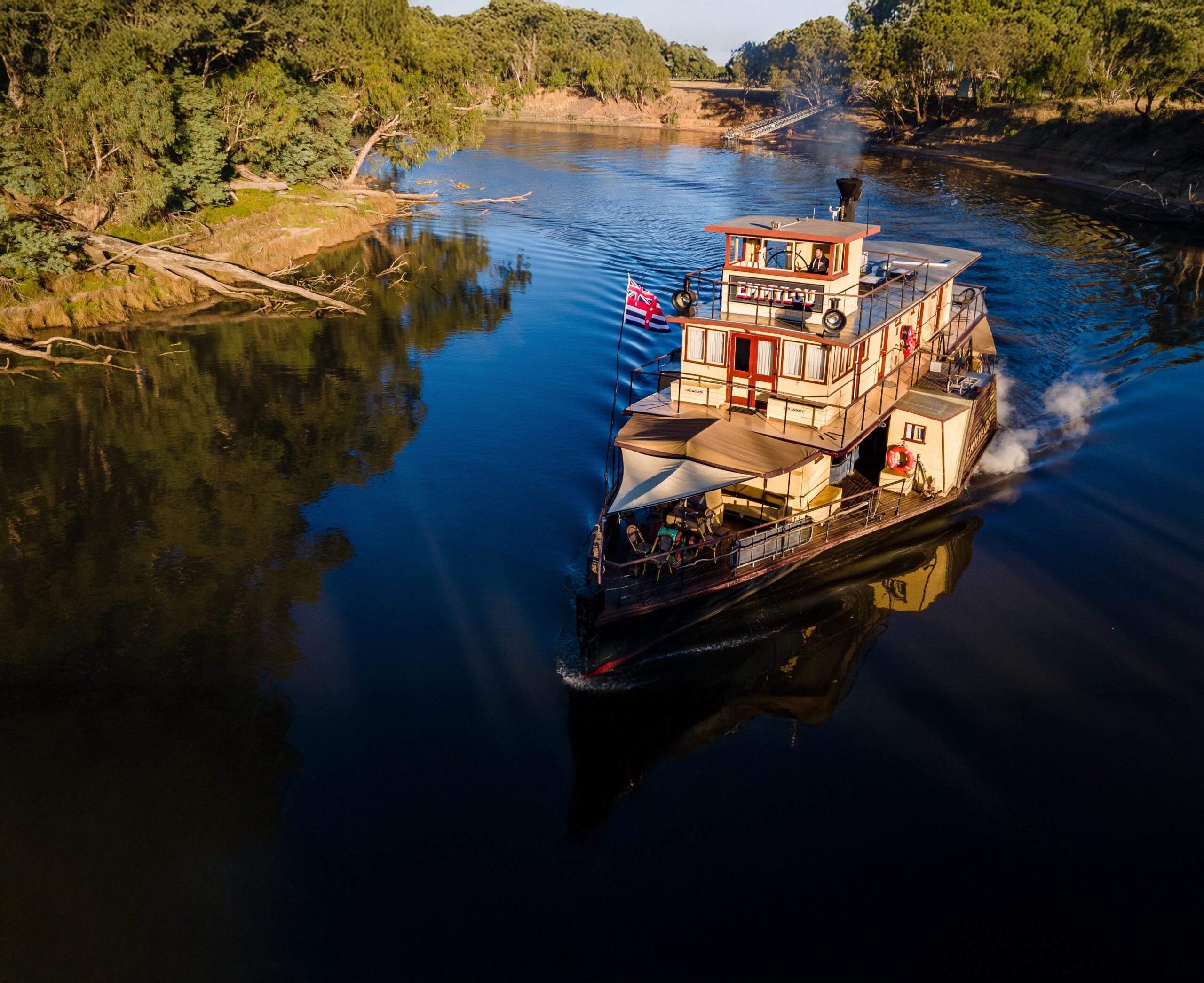
New Dates Coming Soon

Bernadette is a trained actor, psychologist, businesswoman, and writer. Passionate about the arts, culture, and how others live, Bernadette’s travel experiences are many and varied. She’s explored every state and territory in Australia and has the greatest fondness for those…

SCOTT MCGREGOR has been involved in the media for over 30 years as an actor, presenter, writer and producer, but sharing his love of travel, and particularly railway travel, is where his passion now lies. Graduating from NIDA in 1979, he appeared in…
From imperial capitals to ancient ruins, eastern mystique to Aegean shores - experience Turkey in motion in the company of the founder and owner of Railway Adventures and his partner, two of our most experienced tour leaders, and our expert local Guide. Experience magical Istanbul, a city that defies time; ride in a private carriage on the overnight Diyarbakır Express train into Anatolia’s lesser-visited yet deeply evocative region; immerse yourself in the lunar-like valleys and fairy chimneys of Cappadocia; explore the world of the Whirling Dervishes; be transported back in time in Ephesus, Pamukkale, and Pergamon; and pay homage at the solemn battlefields of Gallipoli. This is not just a tour - it’s a ride through a vibrant tapestry of civilisations, flavours, and landscapes, woven together by the rhythm of the rails, road and air. Along the way, you’ll enjoy first class accommodation, fabulous food, great wine, amazing stories, wonderful people, spectacular scenery, and make new friends.
Welcome to Istanbul!
Upon arrival, you’ll be met at the airport and transferred to your hotel for check-in, which is available from 2.00pm.
Our tour begins tonight at 6.00pm with a welcome drink in the hotel to meet your tour leaders and fellow travellers before heading out for a special Welcome Dinner to toast to the start of our journey together. Drinks are on us!
Overnight: The Peninsula, Istanbul (D)
This morning after a relaxed breakfast, we’ll step into the rich tapestry of Istanbul’s past, using our feet and the local train and tram system. After meeting our expert local guide in the hotel lobby, we’ll head over the river by train to the breathtaking Hagia Sophia, one of the most iconic and awe-inspiring buildings in the world – a monument that has served as a church, mosque, museum, and mosque again over nearly 1,500 years – a genuine symbol of the shifting tides of religion, empire, and culture in both Byzantine and Ottoman history. Commissioned by the Byzantine Emperor Justinian I and completed in 537 AD, Hagia Sophia (Greek for “Holy Wisdom”) was designed to be the greatest church in Christendom – its massive central dome, soaring to over 55 metres, was an architectural feat centuries ahead of its time.
We’ll pause for a coffee (or two) before taking the short walk to the mysterious Basilica Cistern, a subterranean marvel supported by ancient columns, and one of Istanbul’s most fascinating and atmospheric historical sites. Hidden beneath the bustling streets of Istanbul, this ancient underground water reservoir dates back to the 6th century and once served the Great Palace of Constantinople. Continue on to the serene beauty of the Blue Mosque, an enduring symbol of Ottoman grandeur and famed for its stunning blue Iznik tiles, cascading domes, and six slender minarets. Built between 1609 and 1616 as a demonstration of Ottoman power and devotion to Islam, it was unusual for its time in that it was funded by the state treasury rather than the spoils of conquest.
We’ll stop for a delicious Turkish lunch in the historic Sultanahmet district before venturing to the vibrant Grand Bazaar, one of the world’s oldest and largest covered markets that today covers over 30,000 square metres and contains more than 60 streets and over 4,000 shops. Founded shortly after the Ottoman conquest of Constantinople in 1453, the Grand Bazaar began as a small warehouse market and was the centre of the Ottoman Empire’s commercial life for centuries, handling everything from silk and spices to gold and weapons. You’ll have plenty of free time to explore the colours, scents, and sounds of this maze-like hub of culture, commerce, and craftsmanship that encapsulates Istanbul’s lively spirit.
Dinner tonight is at leisure – you may like to stay on at the Bazaar, or explore the restaurants around our hotel.
Overnight: The Peninsula, Istanbul (B,L)
This morning after breakfast, we’ll head over to the majestic Topkapi Palace, one of Istanbul’s most iconic and historically significant landmarks. Commissioned by Sultan Mehmed II (the Conqueror) shortly after his conquest of Constantinople in 1453, overlooking the Bosphorus from a dramatic perch on the Seraglio Point, this sprawling palace was the primary residence of Ottoman sultans for nearly 400 years (from the 15th to the 19th century). Today, it’s a UNESCO World Heritage Site and Museum.
A short walk away is the Hippodrome of Constantinople, now known as Sultanahmet Square, once the social and sporting heart of the Byzantine Empire. Originally built by the Roman Emperor Septimius Severus in the 3rd century AD and later expanded by Emperor Constantine the Great in the 4th century, the Hippodrome served as a chariot racing arena and a venue for public ceremonies, political events, and imperial processions. At its peak, it could hold up to 100,000 spectators, rivaling Rome’s Circus Maximus. Though little remains of the original structure, its surviving monuments include the pink granite Obelisk of Theodosius, brought from Ancient Egypt to Constantinople in the 4th century; the Serpent Column, commemorating the Greek victory over the Persians at the Battle of Plataea (479 BC); and the Walled Obelisk, a Roman-built column.
You’ll then venture to the Egyptian Bazaar, also known as the Spice Bazaar, where a kaleidoscope of colors, scents, and flavors fill the air, offering everything from aromatic spices to sweet Turkish delights. After a look around, we’ll stop for a riverside lunch before walking to Sirkeci Train Station, one of Istanbul’s most iconic and historic railway terminals, famed as the eastern terminus of the legendary Orient Express, to catch our train back to our hotel. Built in 1890 during the late Ottoman Empire, Sirkeci Station was designed by German architect August Jachmund, blending Orientalist and European architectural styles. Its stained glass windows, arched entrances, and domed interiors reflect a romantic vision of East-meets-West travel during the golden age of rail. For decades, it welcomed travelers arriving on the Orient Express, the luxury train that ran from Paris to Istanbul, immortalized in literature and film.
The rest of the afternoon and evening is free for you to explore the vibrant area around our hotel.
Overnight: The Peninsula, Istanbul (B, L)
This morning we have an early start. After checking out and collecting our breakfast boxes from the hotel, we’ll transfer to Söğütlüçeşme Railway Station to board Turkey’s modern YHT (High-Speed Train), to be whisked across the scenic Anatolian countryside to Ankara, the nation’s capital. Upon arrival, we’ll be met by our private coach, and after lunch at a local restaurant, savoring Ankara’s traditional flavors, we’ll transfer to your hotel and check in.
The rest of the evening is yours to relax – take a stroll down the vibrant cafe strip outside our hotel for some dinner at leisure or simply unwind at the hotel.
Overnight: Grand Mercure Hotel or Similar, Ankara (B, L)
After breakfast and check out, we’ll set off to explore Ankara’s most significant landmarks, beginning at Anıtkabir, the impressive mausoleum of Mustafa Kemal Atatürk, the founder of modern Turkey. After taking in the powerful symbolism and serene grandeur of this national monument, we’ll continue to the fascinating Museum of Anatolian Civilizations, home to remarkable artifacts from prehistoric Anatolia through to the Ottoman era, offering a vivid glimpse into the region’s rich, layered history.
After lunch at a local restaurant, you’ll enjoy some free time before transferring to the railway station to board the Diyarbakır Express, our home on wheels for the next 24 hours. Settle into your overnight train compartment and experience a classic rail journey east through Anatolia, as the evening landscapes unfold outside your window.
Dinner is served on board.
Overnight: Diyarbakir Express (B, L)
After waking up to Anatolian views, we’ll pull into Malatya and enjoy breakfast in a local cafe and a guided walking tour of the city.
Malatya is a vibrant city known as the “apricot capital of the world,” producing over half of the globe’s dried apricots. Situated along the Euphrates River at the foot of the Anti-Taurus Mountains, it has a history spanning millennia, and is home to significant archaeological sites, including the UNESCO World Heritage Site of Arslantepe (Aslantepe) Mound, a 6,000-year-old settlement revealing ancient palaces and artifacts. The city blends modernity with tradition, featuring bustling bazaars like the Apricot Market, historic landmarks such as the 13th-century Ulu Mosque, and natural attractions like the Levent Valley’s dramatic rock formations.
Back on the train, we’ll enjoy some lunch before settling in for the rest of the journey through to Diyarbakir, arriving in the late afternoon. Upon arrival, we’ll transfer directly to our hotel and check in for some time to freshen up before regrouping for dinner.
Overnight: Radisson Blu Hotel, Diyarbakir (B,D)
This morning after breakfast and checkout, we’ll set out to explore Diyarbakir, a place where history, culture, and modern life collide, with a rich tapestry woven from its ancient past and diverse population. Diyarbakır’s history stretches back over 3,000 years, with evidence of settlement from the Neolithic period. Known as Amida in antiquity, it has been ruled by empires like the Assyrians, Persians, Romans, Byzantines, Umayyads, Abbasids, Seljuks, and Ottomans. The iconic Diyarbakır Fortress and city walls, built in the 4th century by the Romans, are a UNESCO World Heritage Site. These basalt walls, stretching about 5.5 km, are among the best-preserved in the world, with towers and gates like the Dağ Kapı and Mardin Kapı.
After a visit to the Fortress, we’ll continue to the Diyarbakır Museum, housing fascinating artefacts that trace the region’s layered past from the Neolithic period through to the Ottoman era.
Following lunch in a local restaurant, we’ll transfer to the airport for an afternoon flight back to Ankara. Upon arrival, we’ll transfer directly to our hotel for an evening of leisure.
Overnight: Grand Mercure Hotel or Similar, Ankara (B, L)
This morning after breakfast and checkout, we’ll board our private coach and travel to the enchanting UNESCO World Heritage region of Cappadocia in central Turkey, renowned for its surreal landscapes, fairy-tale rock formations, and rich historical and cultural heritage. Inhabited since prehistoric times, Cappadocia was a crossroads for civilisations, including the Hittites (c. 1800 BCE), Persians, Romans, Byzantines, and Ottomans.
On the way, we’ll stop at Özkonak Underground City, one of the remarkable ancient subterranean complexes in Cappadocia, offering a fascinating glimpse into the region’s history and ingenious engineering. Likely carved out between the 4th and 10th centuries, Özkonak was used by early Christians and other communities as a refuge from invasions, including Roman persecutions, Arab raids, and later conflicts. Its exact origins are debated, with possible Hittite or earlier influences. Built for defense, the underground city provided shelter for thousands, with living quarters, storage, and ventilation systems to sustain inhabitants during sieges. And if we time it right, we’ll get to share apple tea with the farmer who discovered this amazing site.
We’ll continue on to Goreme in the heart of the region and enjoy lunch in a local restaurant before exploring the UNESCO World Heritage-listed Göreme Open-Air Museum, renowned for its rock-cut churches and vibrant frescoes depicting biblical scenes carved directly into the rock.
It’s then to our hotel to check in and enjoy dinner together.
Overnight: The Alden, Ürgüp (B,L,D)
Cappadocia’s otherworldly terrain was shaped by volcanic eruptions millions of years ago, with wind and water eroding soft tuff (volcanic ash) into fairy chimneys, cones, and mushroom-shaped rock formations.
This morning before breakfast you have the option of taking a hot air balloon ride at sunrise over this incredible landscape. You’ll return to the hotel for breakfast with your fellow travellers. (Note:This will be at your own expense but we will manage your booking).
After breakfast, our wonderful guide will take us on a tour of the Paşabağ Valley and Uçhisar Castle, two of the unique features of this region. Paşabağ Valley (also known as Monks Valley or Paşabağı) is famous for its dramatic, mushroom-shaped fairy chimneys, formed by erosion of soft volcanic tuff topped with harder basalt caps. These towering formations, some with multiple caps, create a fantastical, almost alien landscape. Paşabağ earned its nickname “Monks Valley” due to its history as a retreat for Christian hermits and monks in the Byzantine era (4th–13th centuries). They carved chapels and living quarters into the fairy chimneys, seeking solitude for prayer and meditation, like St. Simeon Stylites, a 5th-century monk who lived atop the pillars for ascetic purposes.
Uçhisar Castle is not a traditional castle but a massive rock outcrop, naturally formed from volcanic tuff and eroded over millennia. Its towering presence, riddled with caves and tunnels, resembles a castle, earning its name. Inhabited since Hittite times (c. 1800 BCE), Uçhisar was used as a defensive stronghold by various civilizations, including the Romans, Byzantines, Seljuks, and Ottomans, due to its strategic position. Early Christians carved rooms, tunnels, and churches into the rock for shelter and worship, similar to other Cappadocian sites like Özkonak Underground City and Paşabağ Valley. The castle’s height and natural fortifications made it ideal for spotting invaders and signaling nearby settlements, with tunnels connecting to surrounding valleys for escape or supply routes. Both a geological marvel and a historical fortress, the stunning 360-degree views of the region’s surreal landscape, fairy chimneys, valleys, and distant Mount Erciyes will make the climb up worth it.
After lunch in a local restaurant, the afternoon is yours. You can either return to the hotel and relax or you may like to join our private Guide for a very special shopping excursion. Turkey is famous for its carpets and ceramics but it’s easy to get misled about quality and price when shopping for both. This afternoon, you have a chance to privately visit two government accredited artisans to both learn about the crafts and the process, and purchase something with complete confidence. All purchases can be shipped, complete with insurance.
Dinner tonight is at leisure.
Overnight: The Alden, Ürgüp (B,L)
This morning after breakfast and check out, we’ll board our private coach for the journey to Konya. After lunch on the road, we’ll stop at one of the world’s most significant archaeological sites, Çatalhöyük located in the Konya Plain of central Turkey. This ancient proto-city, one of the earliest known urban communities and a UNESCO World Heritage site, dates back to the Neolithic period (ca. 7500–5700 BCE), before Mesopotamia and Ancient Egypt, and is a remarkable window into early human settlement, agriculture, and culture. It housed an estimated 5,000–10,000 people at its peak, making it a major centre for its time, and is a key example of the transition from hunter-gatherer societies to settled farming communities. Residents cultivated wheat, barley, and legumes and domesticated animals like sheep and goats. Çatalhöyük society is renowned for its complex social structure, art, and religious practices, offering insights into early human beliefs and daily life.
Upon arrival in Konya, we’ll check into our hotel and have some time to unwind before walking across to the Mevlana Cultural Centre for a special experience to witness a Sema ceremony performed by Mevlevis, a mystical Islamic order, known to the world as Whirling Dervishes. A pin-drop silence hangs over the auditorium, broken softly by a reed flute solo as lilting and melodious as a call to prayer. A dozen men file onto the stage in tall, conical hats, their bodies wrapped in black cloaks. Voices and drums join the flute in a stately march of Ottoman court music, before the men throw off their cloaks, revealing white tunics and wide skirts. They begin to whirl, slowly at first and then quickening along with the music, until they resemble a blur of spinning tops, all in perfect time yet each one lost in his own ecstatic dance.
For anyone who is interested, there will be an opportunity to visit the Mevlana Museum and mausoleum of Rumi, the founder of the Mevlevi order.
Dinner tonight is in the hotel.
Overnight: Hilton Garden Inn, Konya (B,L,D)
This morning after breakfast and check out, we’ll board our private coach for the journey across the Anatolian heartland to Denizli, gateway to the natural wonders of Ephesus, Pamukkale and Heiropolis. Along the way, we’ll enjoy a few scenic stops, stretch breaks, and lunch. Take in the changing landscapes as you travel from the Central Anatolian plateau toward the Aegean region.
Closer to Denizli, we’ll visit the UNESCO World Heritage site of Pamukkale, known for its stunning white travertine terraces and thermal springs. The name “Pamukkale” translates to “Cotton Castle” in Turkish, reflecting the surreal, cloud-like appearance of the calcium carbonate deposits formed over millennia by mineral-rich hot springs cascading down a hillside. These terraces, resembling frozen waterfalls or tiered pools, are both a geological marvel and a cultural treasure. Perched atop the terraces, is the ancient Greco-Roman city of Heiropolis, founded in the 2nd century BCE, once a thriving spa city under Hellenistic and Roman rule, later becoming a Christian centre with the martyrdom of St. Philip the Apostle. It features well-preserved ruins, including a 2nd-century theater seating 15,000, a necropolis with over 1,200 tombs, a grand colonnaded street, and the Plutonium, a sacred cave once thought to be an entrance to the underworld. If you’re keen, you can swim in the thermally heated Cleopatra’s pool, among submerged ancient columns. Legend claims Cleopatra herself bathed here, though evidence is anecdotal.
Upon arrival in nearby Denizli, we’ll go directly to our hotel and check in and enjoy dinner in the hotel.
Overnight: Doga Thermal Hotel, Denizli (B,L,D)
After breakfast and check out, we’ll transfer to the railway station for the morning train to Selcuk. Our coach will be waiting for us and after a quick lunch in a local restaurant, we’ll embark on an exploration of the ancient city of Ephesus, one of Turkey’s most spectacular archaeological sites. This ancient Greek and Roman city, a UNESCO World Heritage Site, was founded in the 10th century BCE by Greek colonists, but became a major city under the Romans (2nd century BCE–4th century CE), thriving as a vital port on the Silk Road and a Roman provincial capital, blending Greek, Roman, and later Byzantine influences. St Paul preached here, and the city hosted early Christian councils – the Epistle to the Ephesians in the Bible is linked to its community.
The city declined by the 7th century CE due to silting of its harbor, invasions, and earthquakes, leaving it largely abandoned until rediscovery in the 19th century. Excavations since the 1860s, led predominantly by Austrian and Turkish teams, have uncovered about 15% of the city, with ongoing discoveries every day.
Your tour will include the stunning two-story façade adorned with statues of the Library of Celsus, built in 117 CE, and one of the best-preserved Roman libraries, holding 12,000 scrolls at its peak; the Great Theatre, a massive amphitheatre seating 25,000, used for gladiatorial contests, plays, and assemblies, with excellent acoustics still functional today; the more recently discovered Terrace Houses – luxurious Roman homes with colorful mosaics, frescoes, and advanced plumbing, offering insight into elite lifestyles; and Curetes Street, a marble-paved main street lined with statues, fountains, and ruins like the Hadrian Temple and public latrines. Time permitting, you will also visit two of the major early Christian sites – Mary’s House, believed to be where the Virgin Mary spent her final days, and the Basilica of St. John, marking the apostle’s tomb.
After an afternoon immersed in archaeological wonder, you can travel on to Izmir by coach, or take the train with your tour leader. Izmir is located on the Aegean Sea, which you can enjoy from the rooftop bar of our stunning resort hotel, our home for the next three nights.
Dinner tonight will be in the hotel.
Overnight: Swissotel Buyuk Efes, Izmir (B,L,D)
This morning after breakfast, we’ll embark on a city tour of Izmir, known for its rich history, modern vibe, and cultural diversity. Originally called Smyrna, İzmir dates back to at least 3000 BCE. It was a major Greek city, later thriving under Roman, Byzantine, and Ottoman rule, and a key port on trade routes like the Silk Road. Home to Greeks, Armenians, Jews, and Turks over centuries, İzmir was a cosmopolitan centre until the early 20th century, when events like the 1922 Great Fire and population exchanges reshaped its demographics. After Turkey’s founding in 1923, the city emerged as a progressive, industrial, and cultural hub, often dubbed the “Pearl of the Aegean.”
Our tour this morning will take in Konak Square and the iconic Saat Kulesi (Clock Tower), a symbol of Izmir built in 1901; Kızlarağası Hanı, a historic 1744 Ottoman-era caravanserai and marketplace – one of İzmir’s best-preserved and most iconic historical structures, offering a vibrant blend of Ottoman architecture, shopping, and cultural experience; the Kemeraltı Bazaar, one of the oldest and largest open-air markets in the country; and the well preserved ancient Agora of Smyrna, dating back to the 4th century BCE, established during the Hellenistic period after Alexander the Great’s conquests.
Your afternoon and evening is free. You may like to stay in the Bazaar for lunch at leisure and some shopping, relax around the pool at the hotel, or explore more of Izmir on your own.
Overnight: Swissotel Buyuk Efes, Izmir (B)
This morning after breakfast, we’ll set off on a day trip to explore the ancient city of Pergamon, a UNESCO World Heritage Site famous for its rich Hellenistic, Roman, and Byzantine heritage, dramatic hilltop acropolis, and significant contributions to ancient culture, medicine, and learning. Founded in the 3rd century BCE, Pergamon rose to prominence under the Attalid dynasty (281–133 BCE) as the capital of the Kingdom of Pergamon, a major Hellenistic power after Alexander the Great’s empire. Famous for its Library of Pergamon, which rivalled Alexandria’s and housed 200,000 scrolls, the city was a centre of learning, art, and innovation, and is credited with developing parchment. After being bequeathed to Rome in 133 BCE, Pergamon became a key city in the Roman province of Asia, flourishing with grand architecture and a famous medical centre, the Asklepion, which pioneered early medical practices like psychotherapy and hydrotherapy.
After an early lunch at a local cafe, you’ll enjoy a guided tour of this magnificent site, taking in the Acropolis, Pergamon’s centrepiece perched high on the hill offering stunning views of Bergama and the surrounding plains; the 10,000-seat Hellenistic theatre, one of the steepest amphitheatres theatres in the world; the Temple of Trajan, a well-preserved Roman temple showcasing Corinthian columns; and the library ruins.
Leaving Pergamon, we’ll return to Izmir via Soma, where those who wish to travel back to Izmir by train with your Tour Leader will disembark, leaving the coach to continue on.
Upon arrival back at our hotel, your evening is at leisure to explore the many outstanding waterfront restaurants within a short walk of the hotel.
Overnight: Swissotel Buyuk Efes, Izmir (B,L)
After breakfast and check out, we’ll board our private coach for the journey to Canakkale, the gateway to the Gallopili Peninsula. We’ll stop for leg stretches and some lunch on the way and arrive at our hotel mid-afternoon.
After checking in to our hotel, located at the entrance to Çanakkale Pier in the heart of the city, there’ll be some time to relax and explore, before walking to dinner together at the nearby highly regarded Yalova seafood restaurant, overlooking the Dardanelles Strait.
Overnight: Kule Hotel, Canakkale (B,L,D)
Çanakkale is a vibrant coastal city straddling the Dardanelles Strait. The region is steeped in history, with the nearby ancient city of Troy (Truva), dating back to 3000 BCE, famous for the Trojan War in Homer’s Iliad, and is synonymous with the Gallipoli Campaign of World War I, the birth of the ANZAC legend. battle, where Ottoman forces, led by Mustafa Kemal Atatürk, repelled Allied troops.
This morning after breakfast we’ll enjoy a guided walking tour of the old town of Canakkale, including the famous Trojan Horse and the Archaeological Museum, displaying artifacts from Troy including pottery, jewellery, and statues.
After some lunch in a local restaurant, we’ll board the ferry across the Dardanelle Strait to the Gallipoli Peninsula for an afternoon of poignant remembrance visiting war memorials including Anzac Cove, Lone Pine Cemetery and Memorial, the Chunuk Bair Memorial, The Nek Cemetery, Beach Cemetery, Hill 60 Memorial, and the Kabatepe Museum, commemorating the 1915 campaign.
Upon our return to Canakkale, your evening is at leisure to explore the numerous restaurants around the hotel.
Overnight: Kule Hotel, Canakkale (B,L)
After breakfast and checking out, we’ll board our private coach for the journey back to Istanbul.
Upon arrival, we’ll transfer directly to our hotel and check in. The afternoon is yours to relax or keep exploring for some time to freshen up before regrouping for a jolly Farewell Dinner (including drinks) to reminisce on our journey together.
Overnight: The Peninsula, Istanbul (B,D)
Your tour ends after breakfast this morning. Airport transfers will be arranged according to flight schedules. A late checkout will be available for those with evening flights, enabling you to stay on for one last day of leisure in this fabulous city.
(B)
17 nights of accommodation in mainly 5-star Hotels
17 breakfasts, 13 lunches, 8 dinners
Airport transfers to the tour hotel on arrival and from the tour hotel on departure
All transport fares and costs provided for in the itinerary
All meals, drinks, excursions provided for in the itinerary
Two Full-time Tour Leaders travelling with you
Full-time local Guide/Tour Manager travelling with you
Knowledgeable expert local guides
All tipping and gratuities (valued at $500pp)
Travel to and from Istanbul
Travel insurance (Mandatory for international travel)
Visa fees
Meals and drinks not provided for in the itinerary
Things of a personal nature such as phone calls, laundry, room service, etc
The best train trips possible, private luxury coach for off-train travel, guided walking where suitable, and other appropriate and appealing options to make exploration easy
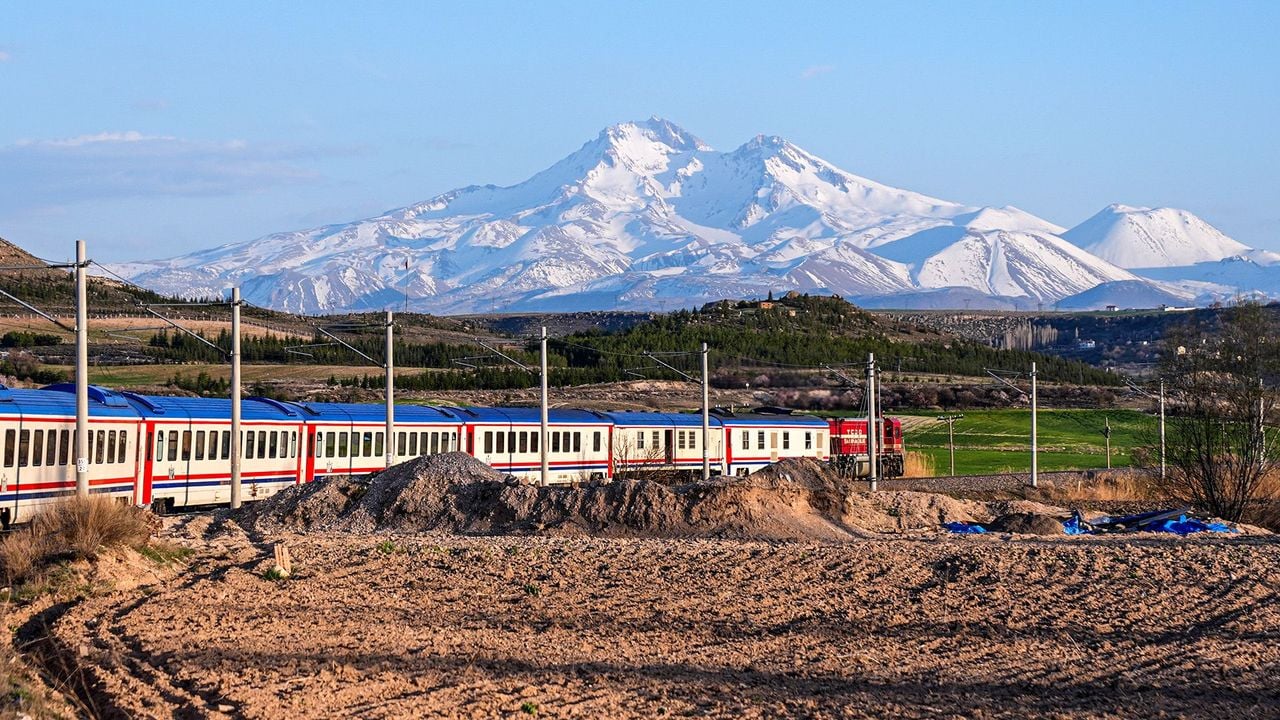
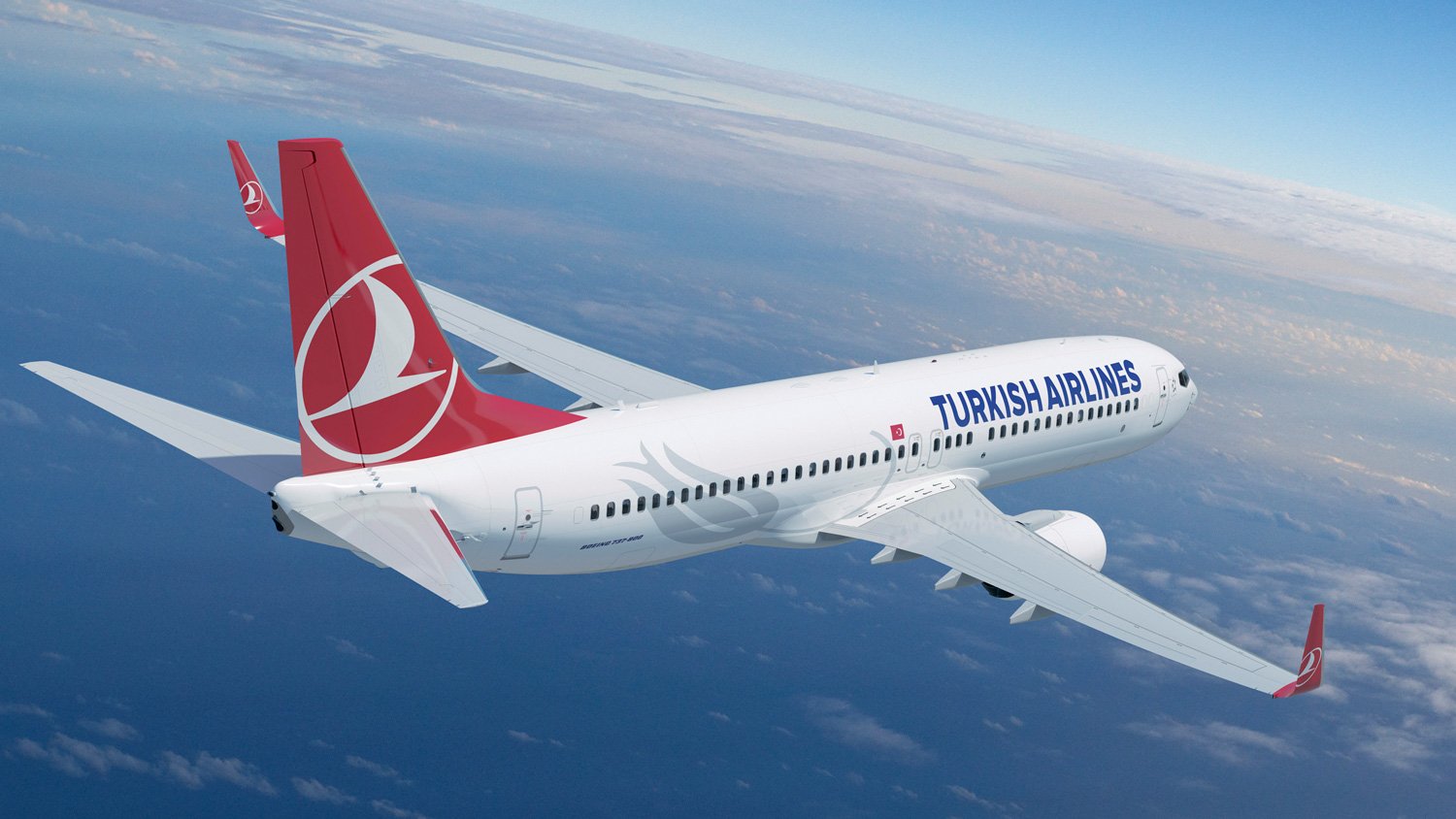

Hand-picked hotels and resorts based on location, customer feedback, value and atmosphere. Please Note: Hotels of a similar standard may be substituted.
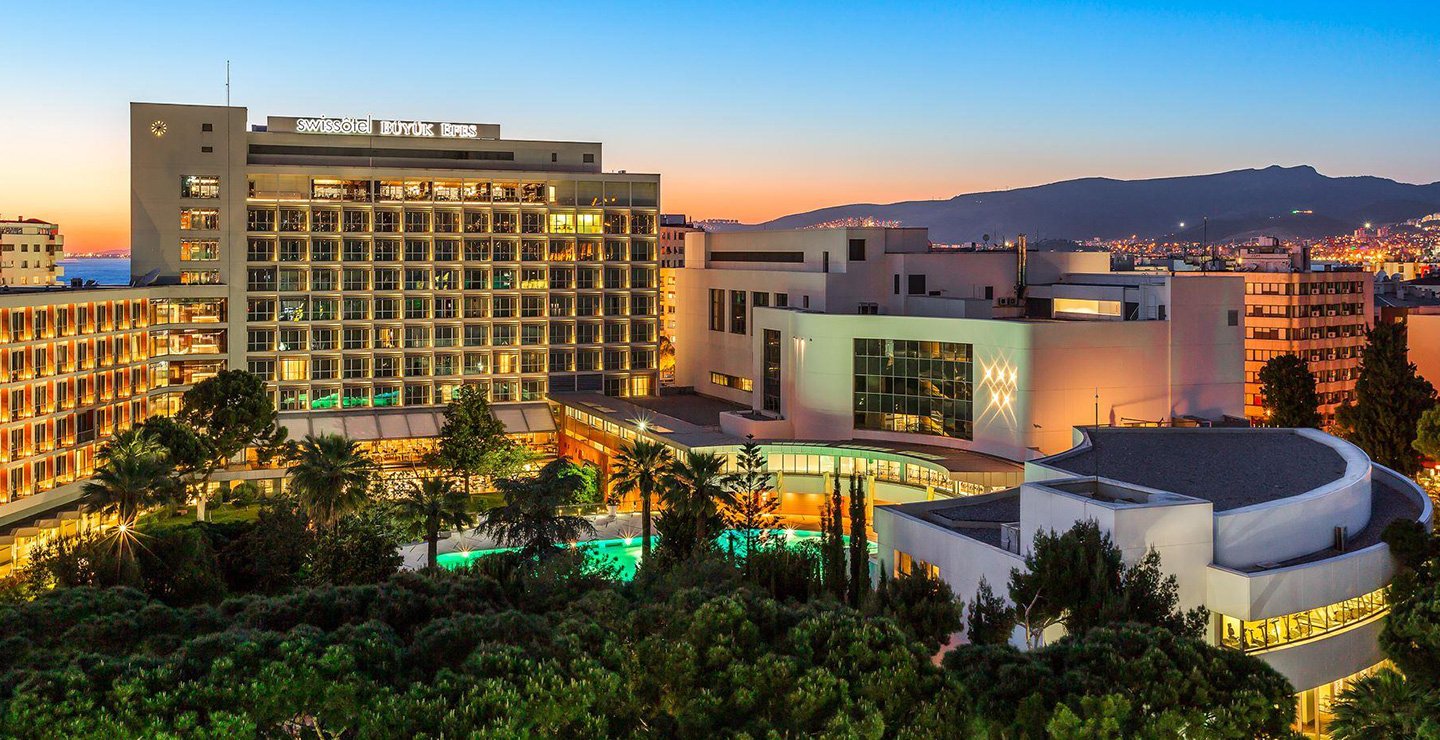
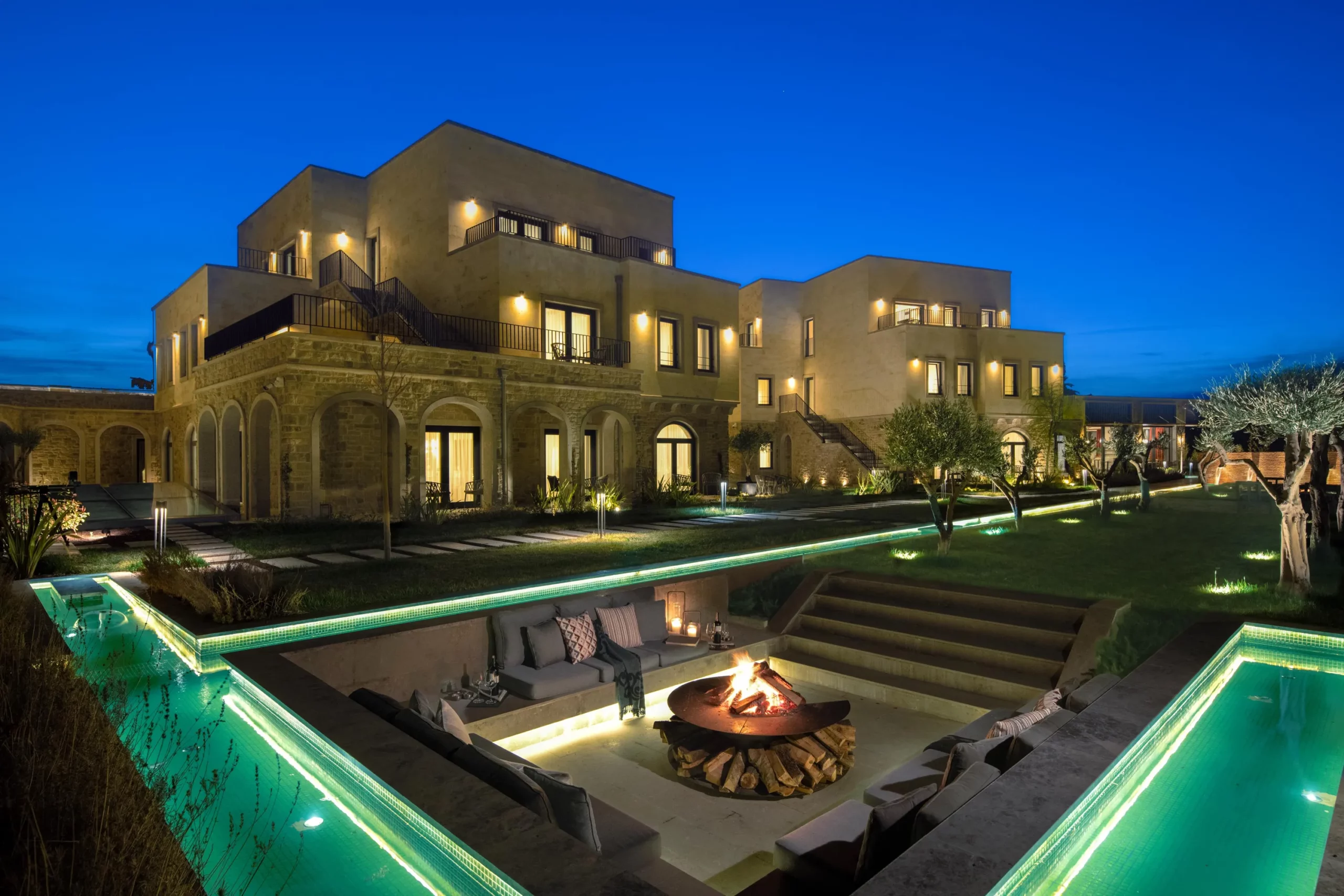
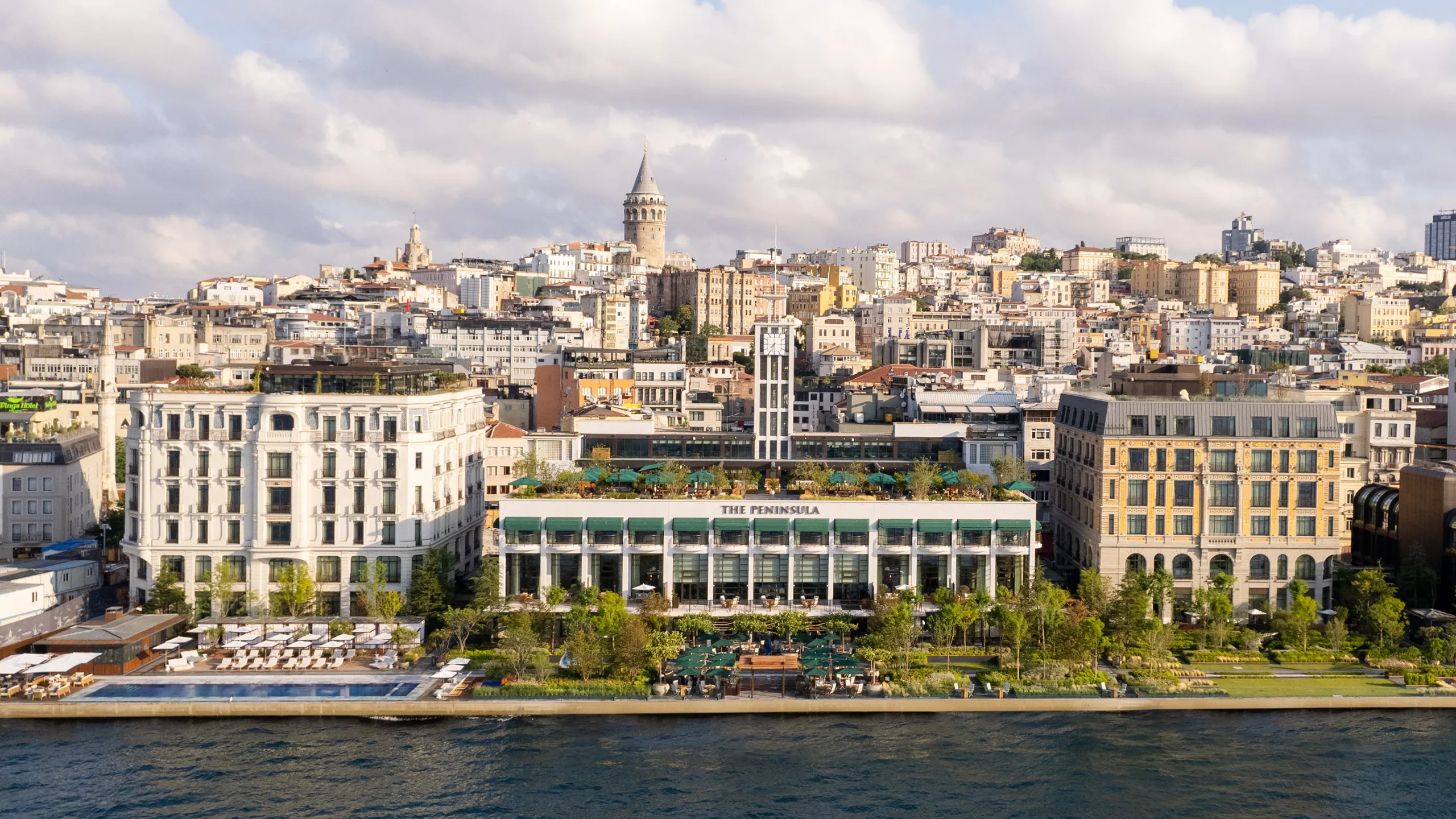
Hear from some of our adventurers that have already ridden the rails with us.
Lorem ipsum dolor sit amet consectetur. Tincidunt convallis magna eu ac eu cursus. In duis fusce risus nec eget habitant massa pharetra. Eros a gravida faucibus lorem.
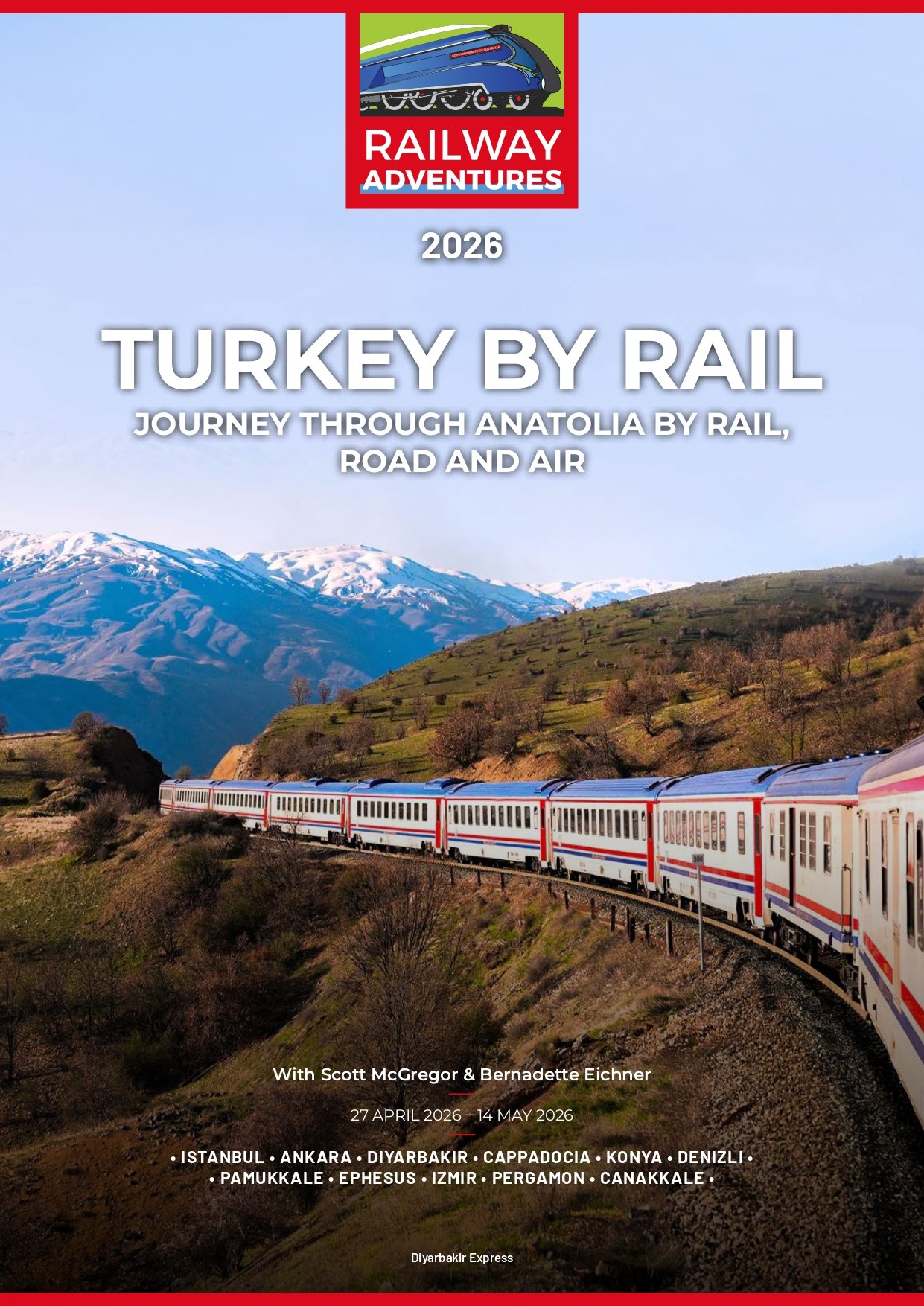
Reserve your place on this exciting exploration of Turkey by Rail.

Train traveller, well known TV personality and travel company owner, Scott McGregor, has travelled on some of the world’s most inspiring railway tours and led the most exclusive group adventures to numerous exotic destinations over the years.
“Rustic, character-filled, zig-zagging railways of Burma, opulent hotels on wheels in India South Africa and Sri Lanka, steam-hauled heritage trains in some of the most staggeringly scenic parts of the world, dinky little rail-cars in outback Queensland, bullet trains in Japan, cliff-hugging lines in Switzerland and Norway—if it travels on a rail track, I’m there!”, exclaims self-confessed train travel tragic, Scott McGregor. “In my mind, travelling by rail is still the most wonderful way to immerse yourself in the country you’re visiting. It’s romantic, relaxing and about as much fun as you can have!”.
Aa a child of the last days of steam trains in the busy junction town of Orange, NSW; trains heading in all directions offering temptations and dreams of faraway places, left an indelible impression on a young, inquisitive boy and Scott has been riding the rails in one form or another ever since. While Scott’s acting career of 30 years kept him busy starring in numerous TV shows and stage plays and then as an on-air presenter on programs such as Better Homes and Gardens, Room for Improvement and various pay-TV programs, his passion for railway tours was ever-present. “Presenting a series of Railway Adventure travel programs for Channel 7 was a career highlight”, he says with as much enthusiasm now as he had then.
In 2012 Scott decided to combine three of his passions; travel, trains and presenting, and launched Railway Adventures. Not only does he get to expand his own horizons and indulge his love of train travel, he gets to use his extensive hosting experience and love of people to lead other like-minded travellers on escorted train tours around the world. Since then, Railway Adventures has mounted more than 50 tours from Sweden to Sri Lanka, Tasmania to Transylvania, Britain to Burma and Venice to Vietnam, thrilling over 1,000 travellers. New tours are launched regularly, inspired by new trains, new routes and the growing interest in taking a train to some of the world’s most fascinating places. But you don’t have to be a train ‘nut’ to enjoy a Railway Adventures tour – there’s something for everyone!
Just one example of how Scott finds inspiration for a tour can be found in Outback Queensland. “There you find some of Australia’s most eccentric and appealing trains and together with a mail-plane flight over the Gulf and some interesting local coach and boat trips you have the essence of a quintessential Aussie outback adventure. The sleeper train, The Spirit of the Outback, the Savannahlander and the Gulflander (which has been running on the same timetable for more than 125 years!) are all iconic trains that traverse various parts of the wild Outback, Savannah and tropical rainforest landscapes of the vast state of Queensland. Along with some other special treats not available to the ordinary traveller, Railway Adventures passengers get to do it all!.
One of his favourite journey’s is by private train in Sri Lanka. For 2 weeks every year Scott charters the Viceroy Special heritage train to tour the island on a gentle rail cruise with a lucky group of travellers. Staying in luxury resorts and hotels along the way, his special train travels to almost every corner of the scenic island. “Having a private train at your disposal for an adventure around this magic island is a rare treat and a great way to immerse yourself in the scenery and culture of the country.”, he enthuses. “Our Vietnam tour makes use of private carriages attached to regular trains to explore that great country in comfort and in South Africa we use a variety of trains including the luxurious Rovos Rail and the Royal Livingstone steam train to move from one incredible adventure to another”.
Apart from the obvious joy of seeing a country by train, travelling in a small group of like-minded travellers with a dedicated, experienced tour leader and knowledgeable, English-speaking local guides is what really sets Railway Adventures apart. “The camaraderie that comes from both shared purpose and shared experiences on tour is an important aspect of the journey” Scott adds. “We’ve seen many people become life-long friends from the time they shared together along the line. The best feeling in the world is when I welcome these same people on repeat journeys”.
Along with popular destinations like Switzerland, Scandinavia, Outback Queensland and Sri Lanka, a new breed of more unusual destinations has gained great interest. Java, Cuba, Southern Africa, India and the New England region of NSW are just some of the newer adventures on offer. As for Scott’s next escape, it’s most likely some quality time at Ruwenzori Retreat, his own personal train on the Great Dividing Range near Mudgee, Central NSW. Built from a collection of vintage railway carriages it’s now a boutique tourist accommodation, comprising exclusive Orient Express style comfort for up to 13 guests. “When the travels are done, coming back to my own train in the beautiful Mudgee mountains is the most restorative and magical time for this committed rail romantic”, Scott says.